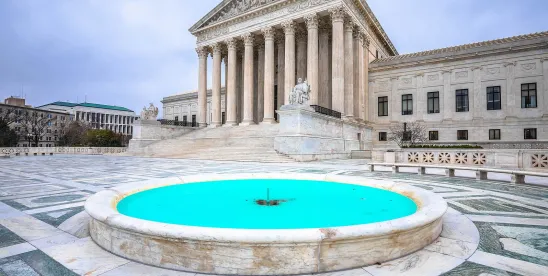On June 20, 2025, the Supreme Court issued perhaps the most momentous decision in Telephone Consumer Protection Act history with McLaughlin Chiropractic Associates, Inc. v. McKesson Corp. This landmark ruling jettisons decades of established practice that bound district courts to follow the Federal Communications Commission (FCC) interpretations of the TCPA.
TCPA litigation has already been extraordinarily active this year, as we recently discussed. This should only accelerate now that the Supreme Court has thrown the gates open for independent court review of the TCPA. Any business that sends calls, text messages, and faxes to consumers needs to revisit the full range of its compliance practices, as new lawsuits are on the way.
Pre-McLaughlin Deference Standard
Before McLaughlin, courts understood a 1950 law called the “Administrative Order Review Act,” or more commonly the “Hobbs Act,” to require them to defer to the FCC’s interpretations of the TCPA in civil cases. While the courts of appeal had more leeway, once the FCC issued a ruling interpreting a provision of the TCPA, district courts were required to follow that interpretation. In general, businesses could rely on FCC guidance to shape their practices, expecting district courts to uphold the agency’s interpretations. As mentioned above, this expectation remained for decades prior to the recent decision in McLaughlin.
The McLaughlin Case
McLaughlin concerned a business that sought to represent a TCPA class that received unsolicited advertisements through both traditional fax machines and online fax services. After class certification, the FCC issued an order interpreting “telephone facsimile machine” to exclude online fax services. Deferring to the FCC’s order interpreting this verbiage, the district court granted summary judgment to the defendant. On an initial appeal, the Ninth Circuit affirmed this grant of summary judgment based primarily on Hobbs Act deference to the FCC.
The plaintiff business sought and received certiorari from the Supreme Court. The Supreme Court (in a 6-3 ruling) reversed the prior decisions in this case and held that the Hobbs Act does not bind district courts in civil proceedings to the FCC’s interpretation of the TCPA. Instead of deferring to the FCC, district courts must independently determine the TCPA’s meaning under ordinary principles of statutory interpretation (while still affording appropriate respect to agency interpretations).
The Court distinguished the Hobbs Act from statutes that expressly preclude judicial review in enforcement proceedings. It interpreted the statute’s grant of “exclusive jurisdiction” to the courts of appeal to “determine the validity” of agency orders as referring only to the entry of declaratory judgments in pre-enforcement proceedings. The Court held this did not apply to subsequent enforcement actions. Justices Elena Kagan, Sonia Sotomayor, and Kentanji Brown Jackson dissented and viewed the exclusive jurisdiction provision differently than in the majority opinion authored by Justice Brett Kavanaugh.
The New Litigation Landscape
The most important takeaway from McLaughlin is the impact this case will be expected to have on future litigation under the TCPA. This is because, under McLaughlin, the TCPA compliance landscape is now wide open for legal challenges. Litigants have already identified several critical topics where established FCC interpretation is now open to judicial review:
- Cell Phones and the Do-Not-Call Registry
One piece of low-hanging fruit is whether cell phones are eligible for the Do-Not-Call Registry (DNC) under Section 227(c) of the TCPA. While the TCPA mentions cell phones at various points, it does not expressly state whether the direction to the FCC to create a DNC for “residential telephone lines” encompasses cell phones. Courts can now independently interpret this language without deferring to FCC guidance.
We already have seen our first post-McLaughlin district court ruling on whether cell phones qualify as “residential” for purposes of DNC protections, as addressed in Wilson v. Hard Eight, 2025 WL 1784815 (D. Or. June 27, 2025). Ultimately, the court decided to align with the FCC and applied DNC protections to cell phones in that case. However, in the wake of McLaughlin, this ruling represents only a single district’s ruling, and future courts may arrive at divergent interpretations on this issue.
- Prior Express Consent Requirements
The FCC has issued extensive regulations defining “prior express consent” in different contexts, but the TCPA itself does not define the term. Although parts of the TCPA expressly bestow authority on the FCC to promulgate regulations, “prior express consent” is not such a topic.
The FCC has ruled consumers implicitly consent to receive automated calls whenever they provide their numbers for a purpose “closely related” to the purpose of the call. For instance, giving a phone number to a bank when applying for an account implied consent to receive a fraud alert.
The foundation for this rule traces back to 1992, when the FCC stated that “[p]ersons who knowingly release their phone numbers have in effect given their invitation or permission to be called at the number which they have given, absent instructions to the contrary.” The FCC reinforced this position in 2008 in the debt collection context, concluding that “the provision of a cell phone number to a creditor, e.g., as part of a credit application, reasonably evidences prior express consent by the cell phone subscriber to be contacted at that number regarding the debt.”
These FCC-derived consent rules are now reduced from binding to merely persuasive value in private litigation.
- Autodialer Technology
While the Supreme Court defined “automatic telephone dialing system” in broad terms in Facebook, Inc. v. Duguid (2021), gray areas remain. FCC guidance has generally stated that, if a human must initiate each call, the system is not an autodialer. But how much human involvement is enough? What if a human loads a contact list, but then the system dials automatically? What about click-to-call platforms where humans trigger each individual call? These situations that seemed settled under FCC guidance are now open for independent judicial interpretation.
What This Means for Businesses
The examples set forth above are just a few of the major TCPA topics where litigators may now roam free and make arguments straight from the TCPA’s text that were previously barred by FCC regulations. Businesses should prepare for increased litigation, diverging district court rulings, and a period of uncertainty while TCPA issues work their way up through the appellate court systems. In the meantime, they should comprehensively review their communication practices with fresh eyes toward the TCPA to best position themselves for this new world.






 />i
/>i
